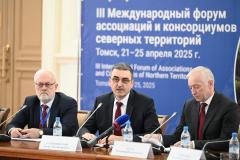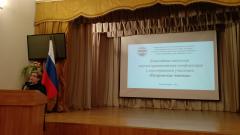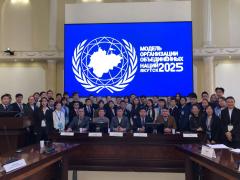
On the third day of the 29th Conference of the Parties (COP29) of the United Nations Framework Convention on Climate Change (UNFCCC) in Baku, the Arctic Pavilion is hosting events devoted to such issues as the indigenous peoples' empowerment and the issue of permafrost in the context of climate change.
The third day was opened by a session of Yugra State University (YUSU) (co-chair of the Russian-Asian Consortium for Arctic Research) «GHG Flux Monitoring Network In Arctic-Boreal Domain Of Northern Eurasia». Roman Kuchin, Rector of YUSU, took part in the session.

«Today on the platform of the Northern Forum there was a very interesting round table on interaction between the network participants of greenhouse gas meters. Both Russian and foreign scientists took part in the event. This fact is very important, because based on the results of the round table we received practical recommendations on how to move forward,» Roman Kuchin shared.

Also today, the session of the OECD Nuclear Energy Agency «SMR for Arctic Sustainable Development: mining in remote applications» was held. The global demand for Arctic mined resources critical to the green transition emphasizes the importance of developing clean energy solutions adapted to the region's needs.
Small modular reactors (SMRs) offer a promising solution to these challenges, especially for sectors that are difficult to decarbonize, such as mining. SMRs can provide reliable low-carbon energy for remote mining operations, reducing dependence on diesel fuel. As global demand for minerals increases, SMRs could support mining operations in locations not connected to the grid, reducing their carbon footprint and meeting production needs. The session examined how nuclear power can contribute to sustainable development in the Arctic, with a particular focus on reducing the carbon footprint associated with the growing global demand for mining in the region.
The European Federation of Geologists held a session on «Arctic for All: Gen X to Z Multidisciplinary Collaboration, Critical Minerals, and Green Energy Production» to raise awareness of the importance of a substantial and extensive discussion on the challenges of obtaining the critical raw materials needed for green energy. Our collective mining history lies in the fact that the developed world is pushing the industry to the Global South and the Poles. This is a critical topic that is virtually absent from COP. Protecting fragile Arctic ecosystems will be critical and will increase pressure on funding for these operations.

The session «Mental Health at the Intersection of Loss and Damage: Empowering Arctic Youth and Indigenous Communities», organized by the UNEP Copenhagen Climate Centre, UNEP, explores the health aspects of loss and damage, with a particular focus on the mental health and well-being of young people. Loss and damage due to climate change is already disrupting the lives of children and young people, affecting their mental health, physical health and socio-economic futures. From eco-anxiety caused by extreme weather events and displacement, to loss of cultural heritage and livelihoods, young people are disproportionately vulnerable to these climate impacts. The event presents case studies, best practices, and policy recommendations that will help communities protect the well-being of younger generations while building resilience and hope in the face of climate change impacts.

The day was concluded with a session titled «Indigenous Voices from Himalayas, Karakoram and HinduKush (HKH) Region: Cryosphere in Crisis» by Climate Forward Pakistan. The event aims to shed light on the critical issue of glacial melt in the HKH region. The area, often referred to as the 'Third Pole', is home to over 7,000 glaciers that are rapidly melting due to climate change. The event focused on the profound effects of climate change on local and global ecosystems, water resources and the livelihoods of indigenous communities that depend on these glaciers. The event aimed to strengthen indigenous perspectives on the degradation of the cryosphere, contributing to a deeper understanding of how this crisis affects not only the Arctic, but also regions that are interconnected through global climate systems.
On November 11-22, the Northern Forum is hosting the first-of-its-kind Arctic Pavilion at the UN Climate Change Conference (COP29) in Baku, Azerbaijan. The general partner of the Arctic Pavilion is the Melnichenko Foundation, the youth partner is the BRICS Youth Energy Agency. More info: https://arcticpavilion-cop.org
Watch live-streaming of all sessions on the Northern Forum Youtube channel.




























